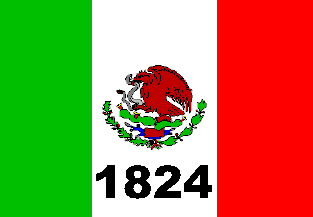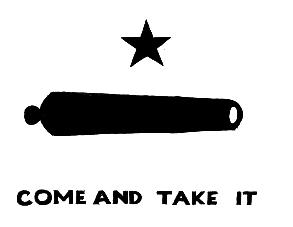  
Sons of DeWitt Colony Texas
  
Presents
Texian Songs, Hymns
and Poetry
Goliad
& San Jacinto | Memorials & Tributes
Goliad and San Jacinto
Entry of Friday May 6, 1836, The Diary of Dr. Joseph H.
Barnard. Dr. Barnard was a physician attached to Col. James Fannin's
command at Goliad, who was spared from massacre and taken with the Centralist army to
Bexar to treat Alamo casualties.
.......Observed this evening, as I walked out, the people collecting in
small groups, talking anxiously together and seeming to have some great news that agitated
them. I was walking with an officer, and did not think proper to inquire of him what it
was, but on meeting some negroes, he requested me to ask of them the news. I did so, and
they informed me that Santa Anna had lost a battle and was taken. At first I could
not credit it, but reflected a moment on the agitation that was visible among the people,
[and] which suggested forcibly to my mind at the moment the commencement of Byron's
celebrated enigma:
Twas whispered in Heaven,
And muttered in Hell,
And echo caught softly
The sound as it fell.
Will You Come to the Bower?
There are many versions of the songs and instruments used at the Battle of San
Jacinto with some accounts of an organized march on the enemy with military fife and drum.
Family legends passed down in the Daniel Davis
family, early DeWitt Colonists, relate that most of the San Jacinto volunteers did not
know how to march, there were no fife and drum on the Texian side, only the simple folk
instruments from home that participants had brought with them. This included mouth
harps ("Jews harp"), homemade whistles, makeshift drums and tom-toms and cymbols
from kitchen utensils. Daniel and son George Washington Davis were fiddlers and were
instructed by General Houston accompanied with his usual profanity for emphasis "to
play something the Texans knew, but which the Mexicans wouldn't take as aggressive"
to feign a drill while the Texians moved to surprise the Mexican camp. They played
what they could think of at the moment, a crude love song which was a waltz, but played
with as much of a march tempo as possible using country fiddles. The tune was
"Will You Come to the Bower?".
Will You Come to the Bower?
Will you come to the bow'r
I have shaded for you?
I have decked it with roses
All spangled with dew.
Chorus:
Will you, will you,
Will you, will you
Come to the bow'r?
(Repeat)
There, soft under the bow'r
On sweet roses you'll rest.
While a smile lights the eyes
Of the girl I love best. |
DeWitt Colonist Creed Taylor in Tall Men with Long Rifles after
the battle of San Jacinto in which he participated.
The strife is o'er, the fight is done
The field is gained, the battle won
The close of the day, the set of sun
Sees Texas free, her race begun.
President of the Republic of Texas, Mirabeau
Lamar, known as the "Father of Texas Education" was a poet and
artist, perhaps the Poet Laureate of the Republic. Although he was a prolific poet
on a variety of subjects, his poems as the above on specific events in Texas history were
rare. According to Phillip Graham in The Life and Poems of Mirabeau B. Lamar:
The night before the battle of San Jacinto, Benjamin Rice Brigham rushed into the
tent of his friends, in search of a substitute for guard duty. "Boys," he said,
"I've stood guard two nights, and am detailed for the third. I want to be in the
battle tomorrow. Will somebody take my place tonight?" A comrade (F. J. Cooke)
volunteered, and Brigham went to sleep. In the battle next day (April 21) he was among the
first to fall, and died a few hours later. Lamar was deeply moved at sight of his
body, and after retiring to his tent he wrote "San Jacinto." The poem appears in
Mrs. Edward Fontaine's album (the present text). An unrevised or a corrupted version was
printed in the Educational Free Press (Austin) for March, 1902 (1,1,P-7).
San Jacinto
by Mirabeau LamarBeautiful in death
The soldier's corse appears,
Embalmed by fond affection's breath
And bathed in his country's tears.
Lo, the battle forms
Its terrible array,
Like clashing clouds in mountain storms
That thunder on their way.
The rushing armies meet,
And while they pour their breath,
The strong earth trembles at their feet,
And day grows dim with death.
Now launch upon the foe
The lightnings of your rage!
Strike the assailing tyrants low,
The monsters of the age!
They yield! They break! They fly!
The victory is won!
Pursue! They faint, they fall, they die!
O stay! The work is done.
Mourn the death of those
Who for their country die,
Sink on her bosom for repose,
And triumph where they lie.
Laurels for those who bled,
The living hero's due.
But holier wreaths will crown the dead
A grateful nation's love! |
Ode to San Jacinto
(From the Austin City Gazette)BENEATH the genial blue-arched southern sky,
Where constant spring yields flowers of every dye;
Where San Jacinto's limpid waters glide,
And mingle with the Gulf's contending tide!
Midst grove-capped bills, adorned with ceaseless green,
Where nature represents her loveliest scene,
And gives her richest beauties to the earth
A nation's independence had its birth.
In such a land---in such a matchless
clime---
Where bird, and bush, and blossom seem divine,
The wild horse sported, and the savage trod---
Untutored one, and one defying God;
Regarding neither law, nor time, nor place,
The sod their bed, their home unbounded space
Until the sons of Anglo-Saxons came,
To find a land so fair to reason's reign.
Yet o'er this fresh and bright luxuriant
land
A soulless despot claimed supreme command,
Who, by his dark and superstitious sway,
Obscured the sacred light of moral day,
And, with his cringing, cowering minions, came
To rear his standard, and his power maintain:
Onward, enraged, he marched o'er field and flood,
Marking each footstep with a patriot's blood.
But here the sons of free-born sires
unfurled
Their one-starred banner, and defied the world
For in no bosom dwelt a selfish thought:
All struck for vengeance, and for justice fought.
They met! the conflict blacken'd like a storm
Foe fell on foe, and form was piled on form,
Until Jacinto's plains were stained with gore,
And freedom's eagle, undismay'd, could soar.
What lofty form, with brave and martial
air,
Rides forth beneath the patriot's lonely star
With steady eye, and heart without dismay,
Directs the movements of that glorious day?
It was the master spirit of the brave
O'er Houston's plume the banners proudly wave;
His country's pride---her hope and boasted chief,
Who won a lasting name and fadeless wreath.
What gallant form led on the foremost
rank,
Unsheath'd his sword and spurred his charger's flank
Then with one shout-one loud, inspiring whoop---
Gave bold examples to the rushing troop;
And like a meteor, through the cloud of strife,
Left death behind, where all before was life?
It was the brave, invincible Lamar---
The son of genius and the soul of war!
Hockley, with eagle eye and dauntless
breast,
And Burleson, the dragoon of the West,
Soon changed the gathering whirlwind of alarm
Into a fierce and loud impetuous storm;
And Wharton was there, whose high, devoted soul
No fear could stay, no mandate could control;
He cheered the conquering, trampled o'er the slain---
"The keenest blade on San Jacinto's plain."
And there was Horton, near his chieftain's
side,
His word to hear, his rushing lines to guide;
Sherman, the brave, and Millard, ever true,
With Rusk, and Coleman, battling close in view;
While Karnes, and Cook, and Somerville, and Bell,
Stood arm to arm where foemen thickest fell
Each, bent on conquest, firmly kept his post
For every man was "in himself a host."
In future time, then may the pilgrim's eye
See here an obelisk, pointed to the sky,
Commemorative of each patriot's name,
Who nobly battled for his country's fame
And on its pedestal, and tapering spire,
Read epitaphs that freemen will admire,
Inscribed in lasting characters of gold,
To celebrate the gallant and the bold.
J.B.R. December, 1841 |
Ode to Texas
From the journal of Dr. Nicholas D. Labadie
God smiled on Texans one day
As confused and bewildered were they;
He took them into His arms
And sounded the triumphant alarm.
From many lands they came to fight
To protect their country and uphold the right.
God sheltered their loved ones behind
As He selected the very best men He could find.
He guided them over the hills and the plains,
Giving them courage in sun and in rain;
Had it not been for Goliad and the Alamo
They may not have been so alert to the foe.
They worked carefully their plans of attack.
Their goal was: "Texas Freedom for a Fact!"
Had God not been on their side in this peril,
The victory would not have been the 21st of April.
"Texas, Free Texas!" it was then proclaimed
The enemy defeated just as He had aimed;
It's no wonder Texans feel so proud,
’Cause they're certainly of God's chosen crowd! |
The Last Hero
by Jake H. Harrison
All alone, we see him standing,
Like a sentry on the wall,
Knowing well that soon upon him
Hands of Death must surely fall;
Last of all the valiant heroes
Who at San Jacinto stood,
Like a grove of giant poplars
In some dark enchanted wood.
Stood for freedom, God and country,
Stood for liberty and right,
Fought with startling odds against the
Facing prospects black as night!
Prison, torture, death, awaited,
If their slender arms should fail,
Yet no hand was seen to tremble,
And no face was seen to pale!
Bravely went they to their duty,
Doing each a hero's part,
Bearing each a freeman's burden
With a brave unshrinking heart;
Till the battle shock was over,
And the foe was forc'd to yield,
Leaving God, and right, the victors,
On proud San Jacinto's field.
Broken was the dread invader
On the wheel of honest might,
Tyrant, insolent dictator,
Conquer'd, captur'd, in the fight!
Glory shone, like stars in heaven,
Liberty was seen to smile.
And the angels guarding Freedom
Chanted praises loud the while!
Then a Nation, proudly stepping
To the front, her flag unfurl'd,
Taking rank in hero annals
With the proudest of the world!
Gone are all those valiant heroes,
Held in such supreme regard;
Gone to him, who in his wisdom
Will their services reward;
Save the one lone figure standing,
Daring still the hand of Fate,
Solitary in his glory
One without a peer or mate!
Bare the head to him, ye freemen,
Worship is not fulsome praise!
Let us make a bed of roses
Out of his remaining days.
[Tribute to Alphonso
Steele, the last
survivor of San Jacinto.] |
Memorials
& Tributes
Tribute to Ben Milam
by Erastus Deaf Smith
Mourn that a master's spirit, a high, heroic soul,
Its earthly light extinguished, is blotted from the roll,
Where stands the bold of Texas, who nobly dared the fight,
That liberty is waging with the haughty hand of might,
Not a loftier heart ere perished, more generous, just and brave
With prouder scorn for coward acts, that make a man a slave.
To the true, the bold, the gallant were his sympathies allied;
As a heart to heart of brother, by bond of blood is tied,
True were his patriot virtues, from the sordid love of self,
From all that makes ambition crime, or stoops to earth for hell
He knew alone his country in the hour of her need;
To free and to exalt her, he sought no other creed.
From earliest of our martyrs to fall in freedom's cause,
To spend the treasure of his blood for liberty and laws.
As bright as thy example, so bright shall be thy fame,
And generations yet unborn shall honor Milam's name.'
Deaf Smith wrote this following the Battle and Siege of Bexar
in 1835 after the death of Ben Milam. He sent it to Milam's
nephew where it was preserved in the Milam family until
publication in the Southwestern Historical Quarterly, vol. 38,
p. 197, 1933. |
Naval Heroes
To Commodore Moore,
and those who fought and died
under the naval banner of the Republic
(Galveston News.)
HARK, bark to the thunders that boom in
the deep,
And shake the broad plains of the sea,
Lo, the war lightnings flash, and the battle-cries sweep,
On the ocean wind wild and free.
Loud, loud is the strife, and more
dreadful it grows,
And brighter the cannon flames glare,
And nearer in conflict the proud navies close
And blacker with smoke frowns the air.
And now on the battle's wild tumult arise
The shrieks of the death-stricken brave,
The patriot's last prayer, as his soul mounts the skies
And invokes God his country to save.
Down swooned to the deck all crimsoned
with gore
Brave Wilber, a lion in fight,
And horror of horrors, young Bryant is pierced
Heaven shrinks from the sad, sickening sight.
Poor boy! tho' thy young days have ended
on earth,
Tho' thy grave is deep, deep in the sea,
Yet Bryant, we'll hallow thy name and thy worth,
And thy deeds in defense of the free.
As long as the ocean wave beats on our
shore,
And freedom a home here shall find,
So long thy misfortunes we'll weep and deplore,
So long shall thy fame be enshrined.
Then Bryant, sleep on with the heroes who
fell,
Their homes and their lives to defend,
They went forth to glory, they welcomed their knell,
For they heard victory's tones with it blend.
Shame, shame on the coward who dastardly
sneers,
And lifts not his voice to applaud
The heroes who dared in the battle to face
The foes of their country, unawed.
Shame, Shame on the being, vile,
heartless, and base,
Who stops not, when battle is o'er,
To blacken the fame and the honor of him
Whose name he had clung to before.
Ingratitude carries a curse on its brow:
And the heart that can nourish its spell
Will sink in dishonor, tho' thousands may bow
And its praises exultingly swell.
But Moore---there are hearts in our
country still true,
There are bosoms unsullied and pure,
And long will they throb still more grateful to you,
While freedom and life shall endure.
Galveston 1842. |
In Memory of Midshipman A.J. Bryant
by William H. Rhodes of Galveston 1844WHEN the hero of a hundred fields
Is stricken to the plain,
And dies amid the expiring groans
Of thousands he has slain;
If o'er his head that banner waved
He battled to uphold,
And triumph greets the band he led
Where war's loud thunders rolled;
A nation's requiem wail is heard
To mourn the warrior's doom;
And every patriot's eye is wet
To yield him to the tomb.
And, Bryant, shall no friendly tear,
Nor heart-felt sigh be thine,
Because thy death-bed was the wave,
Thy grave the ocean brine?
Because thy failing hand grasped not
The banner of the free;
Nor, dying, waved it o'er a foe---
Shall none lament for thee?
So soon have all forgot the day
That thy young breast was bared
To brave the battle's awful shocks,
And all its dangers dared?
When loud around thee cannon pealed
And death's dread bolt flew by!
When angry flame and black'ning smoke
Enveloped sea and sky?
When cries of agonizing pain
Rose o'er the battle's roar,
And gasping friends besprinkled thee
With life's fast ebbing gore?
So soon have all forgot the blows
That drained thy tender veins---
That made thy childish frame a wreck,
Thy life a load of pains?
Shall base ingratitude repay
The debt we owe to thee?
And shall forgetfulness usurp
Thy sacred memory?
Oh, no! brave boy, sleep on in peace,
We'll cherish long thy name.
And deck thy honored memory
With ever-living fame.
Midshipman Bryant was severely wounded
in the engagements of the Texas and Mexican
fleets off Yucatan, while in the service of the
Republic of Texas, and was subsequently lost
at sea by the foundering of the schooner Galveston
---WB.C. Baker The Texas Scrap-book |
The Mier
Prisoners Lament
(From the Galveston News)YE warbling birds in shady bowers,
Your thrilling melodies how gay,
They bring to mind the rapturous hours
I've spent with one who's far away.
When wandering by some crystal rill,
Where fragrance floats on every breeze,
I oft have heard those notes so shrill,
Mid sylvan groves of spreading trees.
Those very notes I oft have heard,
In deep wildwood on summer's day,
When I was with my gentle bird,
My Isabel, who 's far away.
Those blissful hours of peace have passed,
Which I so happily enjoyed,
And I am now in prison cast,
With even worse than death annoyed.
Whene'er ye waft on airy wing,
And through the blue expansion stray,
Go to my love and say, " We bring
A tear from him who 's far away."
Your freedom, birds, I envy not,
But to my fate I'm reconciled.
If to be freed shall be my lot,
I oft may hear your warblings wild.
But if this frame be doomed to death
Her time shall bring another day,
Go tell my wife, my latest breath
Was spent for her so far away.
Go tell her that her husband died
At peace with God,---his sins forgiven,
That the last words his spirit sighed,
Were---" May we meet again in Heaven." |
Epitaph of the Texas Dead
By B. H. DavisNo
slab of pallid marble
With white and ghostly head,
Tells the wanderers in our vale,
The virtues of our dead.
The wild-flowers be their tombstone,
And dewdrops pure and bright
Their epitaph, the angels wrote
In the stillness of the night.
Austin |
From the diary of DeWitt
colony area resident, J.W. Nichols, recalling his
experiences in the US-Mexican War.
"....About ten days after my arivel [in Monterrey] the citizens
gave the officers a ball or fandango. Thare was none invited but commissioned officers,
and this young senorita, Selavia Arista, was thare and her dress and jylery was veriously
estemated at about 5,000 to 25,000 dollars. I had made her acquaintance a few days before,
and as I could speake the Spanish language well, she seemed to look to me for protection
and I had to interduce her at least fifty times that night. She was saught after and
admired by many a young officer of Tailors army. She was the noted senorita,
the Maid of Monterey. She was the one that acted the charitable part to the wounded
soldiers that caused David Cule, the little Irishman, who was wounded thare to compose the
song known as "The Maid of Monterey." She dressed herself in peon or servent
cloaths and went ministering among the wounded soldiers. I will here insert the
song."
[This piece appears elsewhere in
historical records and is credited to various authors]
| The Maid of Monterrey The
moonlight shone but dimly
Upon the battle plaine
A gentle breeze faned softly
Oer the features of the slain
The guns had hushed their thunder
The drums in silence lay
Then came the senorita
The Maid of Monterey.
She gave a look of anguish
On the dying and the dead
And she made her lap a pillow
For him who moaned and bled
Now heres to that bright beauty
Who drives deaths pangs away
That meek eyed senorita
The Maid of Monterey.
Although she loved her country
And prayed that it might live
Yet for the wounded foreigner
A tear she had to give
And when the dying soldier
In her bright gleam did pray
They blessed the senorita
The Maid of Monterey.
She gave the thirsty watter
And dressed each bleeding wound
A fervent prayr she uttered
For those whom death had doomed
And when the bugle sounded
Just at the break of day
They all blest the senorita
The Maid of Monterey. |
From Phillip Graham's Life and Poems of Mirabeau B. Lamar: Lamar,
once President of the Republic of Texas joined General Taylor's US army at Matamoras,
Mexico, in the autumn of 1846, and here he wrote the poem to Doņa Maria Innocente,
daughter of Don Rafael Lopez de Aropoza, upon presenting her," he said, "with a
bunch of flowers." In the early newspaper versions "My bonnie belle" is
apostrophized in the first line-a discord with reference to the Mexican setting. Lamar
changed the phrase to Isabel to correct the defect. The poem was published in: The
Flag (Matamoras), November 11, 1846; The Northern Standard (Clarksville), November 28,
1846; The Brownsville Flag, February 12, 1858; Verse Memorials (1857); The Southern
Intelligencer (Austin), February 24, 1858.
To a Mexican Girl
by Mirabeau LamarMy Isabel-dear Isabell
Oh, take the flowers I send thee;
And with the gift, the donor's prayers,
All blessings to attend thee.
With health , and wealth, and lengthened life,
And many friends around thee,
Oh, be this world a world of flowers,
Without a thorn to wound thee.
Sweet girl, these flowers are like thyself,
Thy native vales adorning,
In all the lovely lights arrayed
Iris and the morning;
But brighter far than any rose,
That blooms by Bravo's water,
Is that which decks thy father's hall
Don Lopez' smiling daughter.
Too oft, alas! unfeeling man
Is viper in the roses-
And many a tear the maid may shed,
Who on his faith reposes;
But wo betide the ruthless one,
By earth and Heaven rejected,
Who woos and wins so sweet a flower,
To leave its bloom neglected!
Full soon the bright bouquet will fade,
For beauty hath a fleetness;
But when the flowers have lost their hues,
They still retain their sweetness:
So will it be dear maid, with thee,
And all the gentle-hearted-
The power to please will linger still,
When beauty hath departed.
Oh, by-and-by, when I am old,
And thou in all thy glory,
Some gayer bard will sing to thee
His love-inspiring story;
And should he be, as I have been,
Still true to love and duty,
Then be the minstrel's high reward
The hand and heart of beauty. |
From Phillip Graham's Life and Poems of Mirabeau B. Lamar:
"Carmelita" was written near Monterey, Mexico, a few days before the
action at that place, where Lamar rendered valiant service. The lady addressed was a
beautiful Mexican girl whose identity has been lost. The poem appears in none of the
Lamar manuscripts, the result of its being composed in camp. After its publication in Verse
Memorials (1857) it was copied widely, appearing in the Tri-weekly Intelligencer
(Austin), October 3, 1857; in the Southern Intelligencer (Austin), October 7, 1857; in the
Northern Standard (Clarksville), December 26, 1857; in The Library of Southern Literature
(Atlanta, 1907), VII, 2996; in Mabel Major's The Southwest in Literature (New York, 1929).
Carmelita
by Mirabeau LamarCarmelita, know ye not
For whom all hearts are pining?
And know ye not, in Beauty's sky,
The brightest planet shining?
Then learn it now-for thou art she,
Thy nation's jewel, born to be
By all beloved, but most by me-
O Donna Carmelita
But wo is me thy love to lose,
Apart from thee abiding;
Between us roars a gloomy stream,
Our destiny dividing.
That stream with blood incarnadined
Flows from thy nation's erring mind,
And rolls with ruin to thy kind,
O Donna Carmelita.
'Tis mine, while floating on the tide,
To stick to love and duty;
I draw my sabre on the foe,
I strike my harp to beauty;
And who shall say the soldier's wrong,
Who, while he battles with the strong,
Still softens war with gentle song,
O Donna Carmelita?
I soon shall seek the battle-field,
Where Freedom's flag is waving-
My Texas comrades by my side,
All perils madly braving;
I only grieve to think each blow,
That vengeance bids the steel bestow,
Must make thee mine eternal foe,
O Donna Carmelita.
Full well I know thy pride will spurn
The brightest wreaths I bring thee;
Full well I know thou wilt not heed
The sweetest songs I sing thee;
Yet, all despite thy scorn and hate,
Despite the thousand ills of fate,
I still my soul must dedicate-
To Donna Carmelita.
Then fare thee well, dear, lovely one-
May happiness attend thee;
Ten thousand harps exalt thy name,
Ten thousand swords defend thee:-
And when the sod is on my breast,
My harp and sabre both at rest,
May thou and thine be greatly blest,
O Donna Carmelita. |
SONS OF DEWITT COLONY TEXAS
Š 1997-2002, Wallace L. McKeehan, All Rights Reserved |





